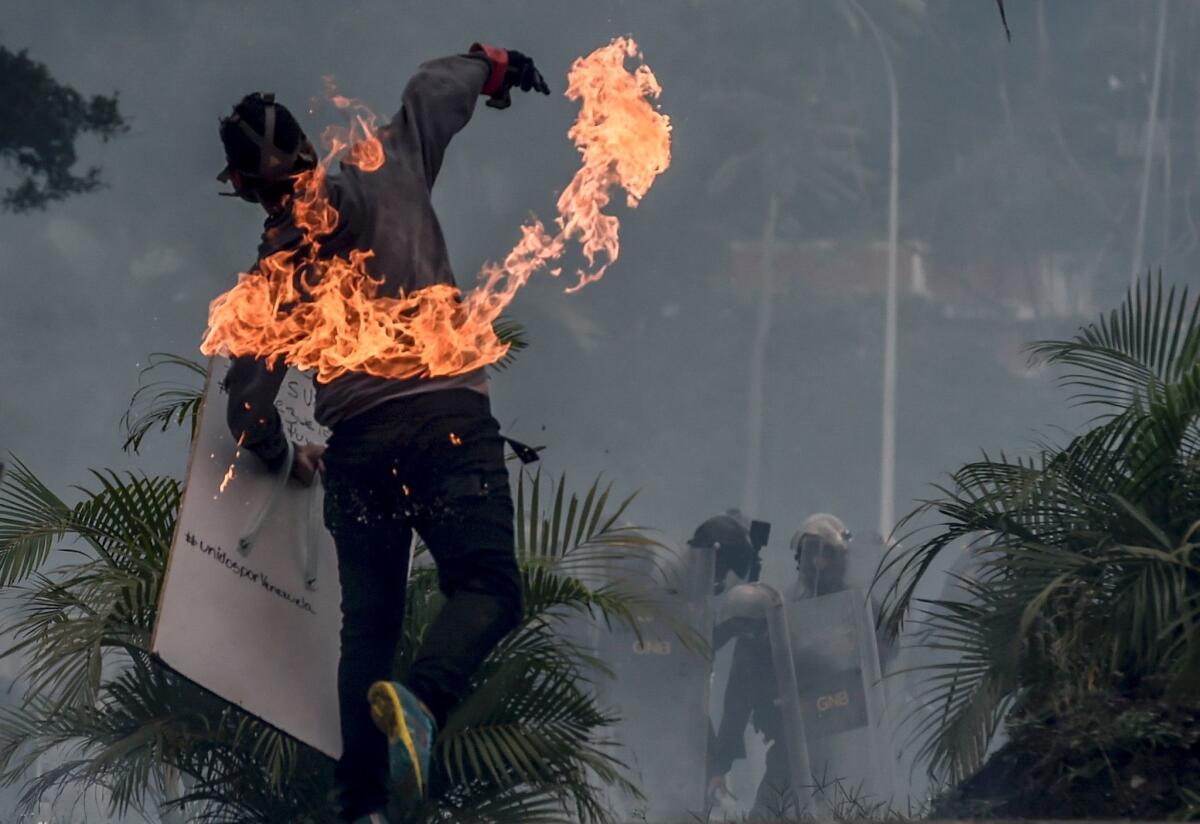U.S. struggles to unite countries in condemning Venezuela

- Share via
Reporting from CANCUN, Mexico — The United States has failed to muster regional support for condemnation of Venezuela despite basic agreements that the government of President Nicolas Maduro has overstepped democratic bounds.
At a conference in the Mexican resort city of Cancun, the 34-nation Organization of American States argued over how to address violence in Venezuela as massive demonstrations challenge the socialist government.
Venezuela walked out of the meetings and said it will become the first nation to withdraw from the OAS.
Delcy Rodriguez, foreign minister of Venezuela, said Tuesday that the OAS agenda had been hijacked by the United States in an “immoral” gesture.
“This is an agenda of attack against Venezuela,” she said. “We are looking for a constructive agenda.”
She came into Tuesday’s meeting briefly, then turned around and marched out. She also had walked out on Monday as the member states of the region’s most important multilateral body debated a resolution condemning Venezuela, a measure that failed. She later returned to the cavernous hall where the conference was taking place.
Deputy Secretary of State John Sullivan said the United States has “joined with a growing number of democracies” to urge Venezuela to release political prisoners and respect elections. He called the resolution a “modest step,” not an intervention.
“We can no longer stand by and watch this suffering,” he said, adding that the “principle of nonintervention cannot be used to justify inaction.”
Rodriguez responded with a diatribe against U.S. imperialism and repeated Venezuela’s vow not to recognize any OAS resolution against it.
She added that no one could tell Venezuela what to do, least of all “the lapdogs of imperialism.”
President Trump has held up Venezuela as a major concern in Latin America and imposed economic sanctions against the Venezuelan vice president and most of its Supreme Court for their failure to uphold democratic principles. The United States also accused Vice President Tareck El Aissami of being a major drug trafficker.
The United States gained great goodwill in Latin America and was able to galvanize the region over Venezuela after former President Obama ended decades of estrangement with Cuba in 2015 and renewed diplomatic ties. That put the United States on par with the rest of the region.
But Trump announced plans to reverse parts of that opening in a speech last week in Miami. That, say many diplomats, has weakened Washington’s hand in the region.
Mexican Foreign Minister Luis Videgaray said in an interview that time would tell how much damage the Trump reversal would have on the ability of the United States to rally support against Venezuela.
“We will continue to work very closely with the United States and very closely with Cuba,” he said. “It’s really a country-by-country thing.”
Mexico had joined the United States in leading the way on condemning the Venezuelan government.
Working behind the scenes, the two countries had chalked up what they thought was a majority of member states to approve a resolution calling on Maduro to reconsider an attempt to rewrite the constitution, a move that would allow him to remain in power probably indefinitely.
But at the last minute Monday, several Caribbean countries decided to abstain. The United States thought the countries were on board with the resolution, but with their absence, the two-thirds majority required under OAS rules fell short.
The vote was 20 countries in favor of the resolution, five against and eight abstentions.
Many in Latin America are reluctant to criticize a leftist government, especially under the auspices of the OAS, which is seen largely as an arm of the U.S. administration.
OAS Secretary General Luis Almagro has been especially vocal about the plight of Venezuelans. Large, near-daily demonstrations in Venezuela against the government have destabilized the increasingly impoverished nation. More than 70 people have been killed in clashes with security forces.
In a speech inaugurating the conference on Monday, Almagro mentioned one of the latest casualties, Fabian Urbina, “murdered by the shots of repression.”
“Every social activist murdered, every human rights activist murdered, every environmental activist murdered, every journalist investigating corruption murdered, every political prisoner, every demonstrator who demands his freedom murdered ... everyone who has died has opened more doors to freedom.”
Oil-rich Venezuela suffered from the decline in petroleum prices and government mismanagement of the economy. Today it is beset with severe food shortages, skyrocketing inflation and one of the highest homicide rates in the hemisphere.
Twitter: @tracykwilkinson
UPDATES:
1:25 p.m.: This article was updated with comments from U.S. officials
This article was published at 12:15 p.m.
More to Read
Sign up for Essential California
The most important California stories and recommendations in your inbox every morning.
You may occasionally receive promotional content from the Los Angeles Times.














